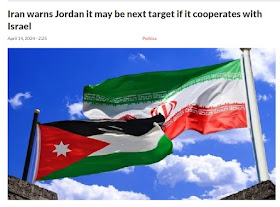Israeli media revealed recently that the Axis of Resistance led by Iran has made plans to invade Israel via Jordan and carry out a large-scale terror attack against Israeli communities near the border. According to the report, Israel’s defense establishment has identified increased motivation among Iraqi Shiite militia groups supported by Iran to attempt to attack Israel via Jordan using aerial platforms or by other means. Israel is preparing for a scenario in which Iraqi or Afghan Shiite terror cells, supported by Iran, try to invade Israeli territory via Jordan to carry out another massacre similar to October 7.
Iran's ambitions to extend its "Shiite Crescent" (an expression coined by Jordan's King Abdullah in 2004) to Jordan has been noted by others, like the Washington Institute:
There is a fear of the resurgence of threats to Jordan from its eastern borders, which are de-facto controlled by armed groups loyal to Iran. A gradual escalation of military operations—so far limited— is visible at the Jordanian-Iraqi-Syrian border triangle, but this escalation is occurring at a pace that is raising fears of a slide into armed conflict and continuous attrition. Such escalation could turn the area into an Iranian proxy war zone similar to that in southern Lebanon between Hezbollah and Israel, and in Yemen between the Houthis and U.S.-led coalition forces.
Jordan reacted to the Iranian attack on Israel Saturday by reportedly shooting down a number of Iranian drones that flew over its airspace.
But as of this writing, Jordan has not admitted to this action. The Twitter/X page of its foreign ministry and its foreign minister have been silent over both Iran's actions and Jordan's reported intervention.
And Iran made a direct threat to Jordan:
Amid escalating tensions, an Iranian military source has suggested that Jordan may face severe repercussions and become the next target if it aligns with the Zionist regime.The caution follows heightened surveillance by Iranian armed forces, closely monitoring Jordan's activities in the aftermath of a retaliatory attack by Iran against the occupied territories on Saturday night.The source emphasized that should Jordan choose to engage in any future actions, it risks becoming the next target of Iran's military operations.
Jordan has a large Palestinian population, and Palestinians are angry at King Abdullah for shooting down the drones, calling him a "traitor." In the wake of the Gaza war, Abdullah has trying to placate his anti-Israel citizens by pretending to support Gazans, even as he is dead set against allowing any to take refuge in his territory.
At any rate, most Jordanians hate Israel (and Jews), and it hurts Abdullah to publicly support Israel. It is possible that Iran looks at this as a secondary benefit of its attack, which it must have known would not have hurt Israel at all.
It seems possible that Iran considers the current tumult to be a good opportunity to destabilize the Jordanian regime from within and without, as well as to test whether the US would come to its aid.



